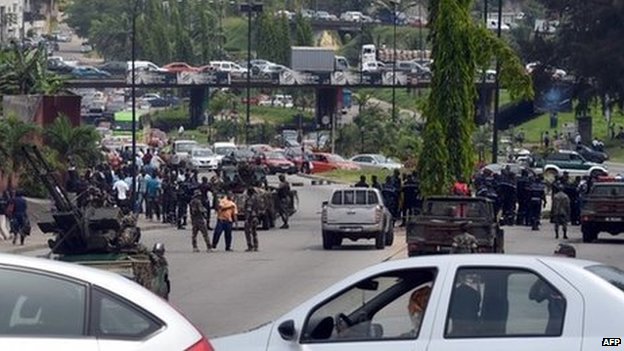Ivory Coast’s defence minister, Paul Koffi Koffi, has ordered soldiers to return to barracks after they staged protests in at least two cities.
Soldiers blocked roads in the main city Abidjan and the second city Bouake to demand unpaid allowances.
Mr Koffi promised that he would address their grievances.
It is the biggest protest involving the Ivorian military since President Alassane Ouattara took office in 2011, ending a civil war.
Bouake is a stronghold of the president, and the protest there suggests he is losing the confidence of some loyalists, correspondents say.
Soldiers sealed off roads around the offices of the national radio and television station in the city, said a witness, who spoke to the BBC on condition of anonymity.
Health care demand
The protest forced shops and banks in the city to close, the witness added.

In Abidjan, soldiers demonstrated near an army base in the neighbourhood of Abobo.
“The soldiers are on the streets,” Reuters news agency quoted a witness as saying.
“They used tyres, old cars, everything they could find to block the road. You can’t get in. All the shops are closed,” the witness said.
There were also protests in three other cities, including Daloa, a hub of Ivory Coast’s cocoa industry, according to Reuters.
Speaking on state television, Mr Koffi said he would hold talks with the soldiers to find “a definitive solution” to their demands for back-pay.
Reuters said Mr Koffi acknowledged that the government had agreed to pay them housing allowances, overdue travel stipends and to allocate money for soldiers’ health care.
Mr Ouattara took power in 2011 after his then rebel forces, backed by UN and French troops, captured his predecessor Laurent Gbagbo.
Mr Gbagbo had refused to step down despite the UN declaring Mr Ouattara the winner of presidential elections the previous year.
About 3,000 people were killed in the conflict between the two sides.
Mr Gbagbo is in the custody of the International Criminal Court. He is due to go on trial next year on charges of crimes against humanity, which he denies.
Source: BBC


